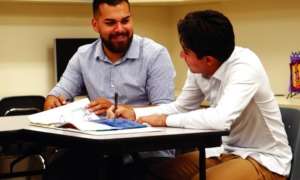National Center for Postsecondary Research
More students enroll in community colleges as opposed to four-year institutions each year, mostly because of the reduced cost. However, community colleges are not keeping pace in terms of student success, and one of the biggest academic problems students are having is passing developmental or remedial math classes. The rates of students passing these classes are low.
This study, examines how two community colleges, Queensborough Community College and Houston Community College, are experimenting with learning communities in their remedial math courses. Learning communities combine the efforts of two teachers and two classes that share the same assignments and curricula. That way, the students have the support of two teachers and a large number of peers doing the same assignments.
The goal of learning communities is to accelerate students’ progress through the math sequence and help them perform better in college, ultimately, to earn degrees or certificates.
Queensborough and Houston are two of the six colleges participating in the Learning Communities Demonstration. They both began implementing a basic model of a one-semester developmental math learning community. The programs strengthened over the course of the demonstration, including more common curricula and some connections to student support services.
Learning community students attempted and passed their developmental math class at higher rates at both colleges.
But, in the next few semesters of the study, the learning community’s impact was far less evident. By the end, control group members at both colleges had caught up with learning community students for the most part. And, on average, the program did not have an impact on persistence in college or cumulative credits earned.
The National Center for Postsecondary Research has concluded that although linked classes can have an impact on students’ achievement during the semester, the effect usually diminishes over time. However, they are continuing with the study, monitoring the programs at other schools in the program, and hope to release a final report in 2012.
Free. 166 pages. www.postsecondaryresearch.org/i/a/document/15909_022211mdrcLC.pdf






























